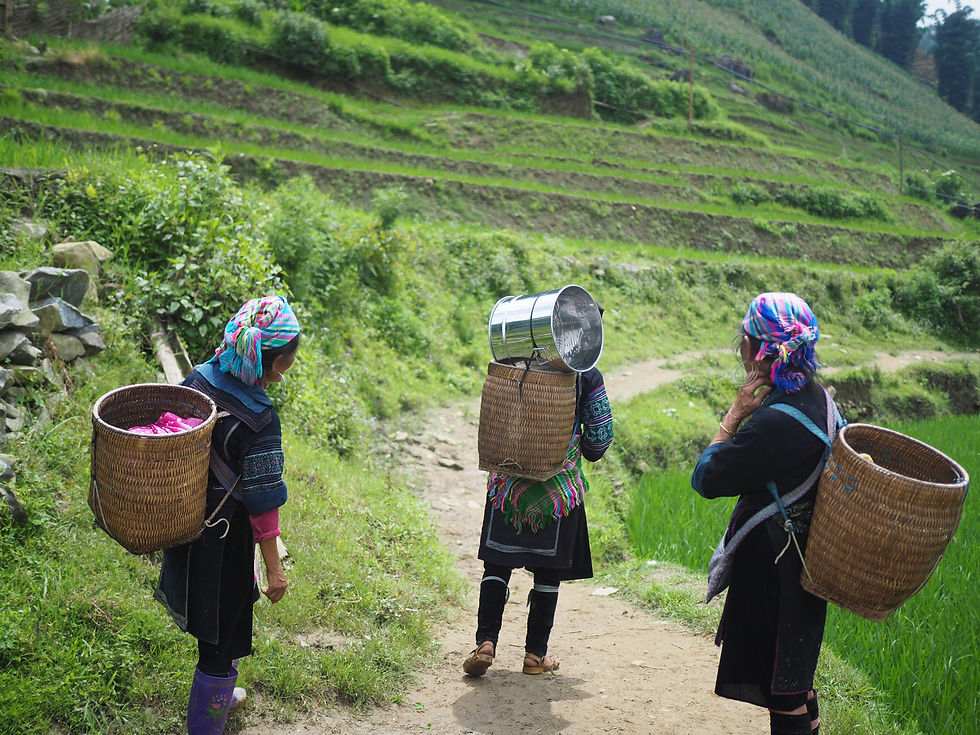By Saumya Surbhi and Sithasa Kanchanavijaya

As the world works to end the inequalities of Indigenous Peoples, it is important to recognize their challenges and celebrate their knowledge and wisdom.
The International Day of the World's Indigenous Peoples, this year, invites everyone to reclaim the roles of indigenous women. They are the backbone of indigenous communities and critical to the preservation and transmission of traditional knowledge. Collectively and individually, they are caretakers of natural resources and keepers of their heritage. Many of them are leaders and defenders of their ancestral lands and advocates of indigenous peoples’ rights worldwide, making them targets of attacks that aim to silence them and stop their advocacy.
During consultations for the Asia Regional Dialogue on Climate Justice for Children, Youth, and Future Generations held earlier this year, young Indigenous environment and climate advocates in the region shared their priorities.
To mark the International Day of the World's Indigenous Peoples, we reflect on and crystallize the lessons learned from the discussions held with indigenous youth, particularly indigenous young women, across 10 countries in Asia and the Pacific. These discussions were part of the larger consultations for the Asia Regional Dialogue on Climate Justice for Children, Youth, and Future Generations held in March and April 2022 ahead of the Stockholm+50 global meeting.
Gender discrimination and threats to safety
In India, Bangladesh and Pakistan, women who advocate for the environment and climate face gender bias, threats to physical safety and restrictions on their ability to build their own capacity. Similarly in Cambodia, Indonesia, Lao PDR, Myanmar, Philippines, Thailand, and Viet Nam, women climate justice advocates primarily encounter gender discrimination and threats to their safety. Women’s advocacy is looked down upon with stigma attached to such roles which adds on another layer to the safety issues that women are already facing.
Discrimination against indigenous advocates devalues their experience and work. The prevalence of patriarchal values in many societies and communities, including indigenous ones, and a lack of acceptance of women as competent advocates make their opinions less valued. Their contributions are often sidelined because of their gender and render them more vulnerable.
When indigenous peoples speak up, they are perceived as security concerns by the local governments and are usually followed by death threats, blacklisting, arrests and more. Along with stigma, threats to the safety of women advocates include verbal abuse and sexual harassment. Moving from place to place for advocacy campaigns also poses a risk for them.
Restrictions
Generally, women – especially the poorest and most marginalized – face barriers to information, resources and are therefore less empowered than men. In other words, they do not have equal opportunities to build their capacity as climate and environmental advocates. Assumptions that indigenous peoples are uneducated, especially about climate change and climate justice automatically exclude them from policymaking forums and participation in developing government policies. The language barriers and lack of quality education add to their feelings of inferiority and unease in communicating with others as well as the lack of resources and particularly the technical knowledge, to be part of bigger discussions.
Indigenous youth noted language barriers, cultural differences and geographical remoteness are the worst of all. Other barriers include the lack of proper guidance and networking, quality education, access to information, access to services, lack of support from governments and other organizations, and very few meaningful engagement opportunities or inclusive, safe platforms to speak and be heard – not to mention influencing change or intervention.
Small yet significant progress has been made by indigenous women in some communities, achieving leadership in communal and national roles, and standing on the frontlines to defend their lands and the planet’s decreasing biodiversity. However, indigenous women are still widely under-represented, disproportionately affected by decisions made on their behalf, and are too frequently the victims of multiple expressions of discrimination and violence.
Way forward
The challenges faced by young indigenous advocates, especially indigenous women, can be addressed through creation of safe spaces, and education to channel social change and break stigmas that plague women advocates, meaningful inclusion and participation of indigenous peoples in decisions about development, and legal empowerment of indigenous youth.
To help women and indigenous environmental and climate justice advocates overcome these challenges, we must first respect and listen to them. We must support them in building their capacity to be advocates, ensure inclusion of women in local committees, and spread awareness against gender biases. Protection measures should be taken more seriously while seeking support for those measures from people in the community, and showing solidarity to recognize the imminent need for men to support women and for women to be in more leadership roles.
We need to encourage them to be representatives in events and respect their capacity to represent others, ensure safe and inclusive spaces for them, and promote their roles and priorities. We should demand that candidates in local and national elections give their support to indigenous and women climate advocates, and call for a legal framework that enables women and indigenous peoples to have a voice and be protected when they advocate for the environment and climate justice.
For these recommendations to work, it is important to actively learn and understand the situations of young Indigenous environment and climate advocates and then create the social awareness required for all the networks to lend a helping hand, and last but not least, provide funds to sustain their advocacy work.
__________________
To learn more about the International Day of the World's Indigenous Peoples, please visit: www.un.org/en/observances/indigenous-day
To learn more about the Youth Empowerment in Climate Action Platform (YECAP), please visit: https://linktr.ee/yecap.ap
YECAP will continue to support and work with indigenous youth across the region through partnerships with Civil Society Organizations (CSOs) like the Asia Indigenous Peoples Pact (AIPP).
Join us to support the cause on #IDWIP2022 ! #LeaveNoOneBehind #YouthEmpowerment #ClimateAction
Comments